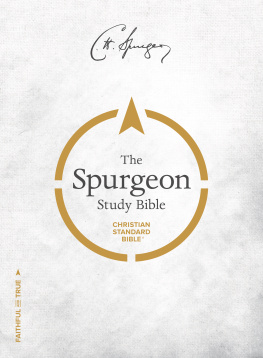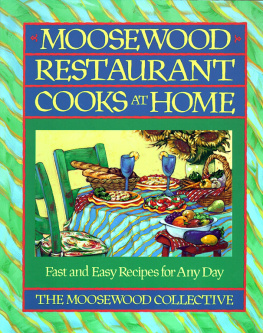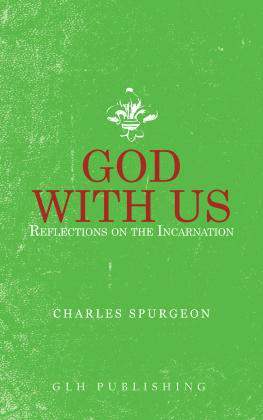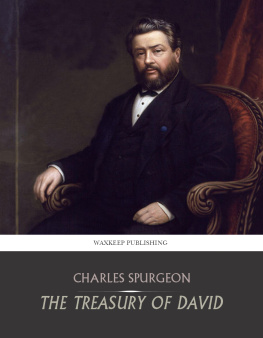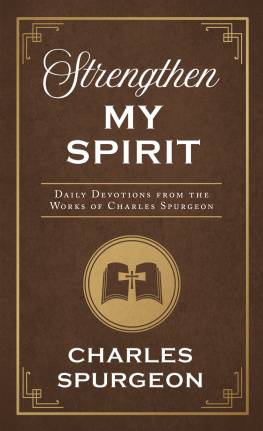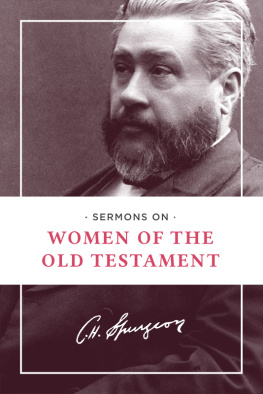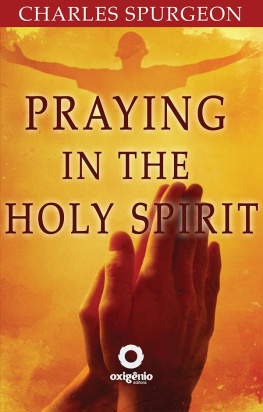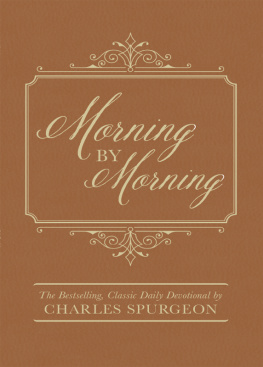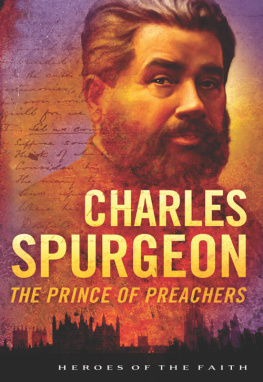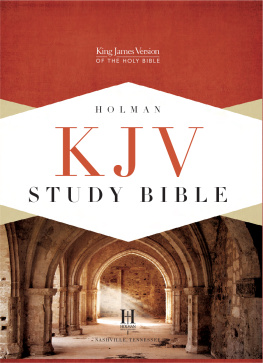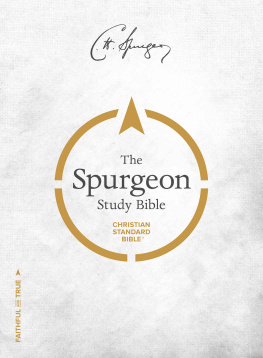Staff - CSB Spurgeon Study Bible
Here you can read online Staff - CSB Spurgeon Study Bible full text of the book (entire story) in english for free. Download pdf and epub, get meaning, cover and reviews about this ebook. City: Nashville, year: 2017, publisher: B&H Publishing Group, genre: Religion. Description of the work, (preface) as well as reviews are available. Best literature library LitArk.com created for fans of good reading and offers a wide selection of genres:
Romance novel
Science fiction
Adventure
Detective
Science
History
Home and family
Prose
Art
Politics
Computer
Non-fiction
Religion
Business
Children
Humor
Choose a favorite category and find really read worthwhile books. Enjoy immersion in the world of imagination, feel the emotions of the characters or learn something new for yourself, make an fascinating discovery.
- Book:CSB Spurgeon Study Bible
- Author:
- Publisher:B&H Publishing Group
- Genre:
- Year:2017
- City:Nashville
- Rating:3 / 5
- Favourites:Add to favourites
- Your mark:
- 60
- 1
- 2
- 3
- 4
- 5
CSB Spurgeon Study Bible: summary, description and annotation
We offer to read an annotation, description, summary or preface (depends on what the author of the book "CSB Spurgeon Study Bible" wrote himself). If you haven't found the necessary information about the book — write in the comments, we will try to find it.
CSB Spurgeon Study Bible — read online for free the complete book (whole text) full work
Below is the text of the book, divided by pages. System saving the place of the last page read, allows you to conveniently read the book "CSB Spurgeon Study Bible" online for free, without having to search again every time where you left off. Put a bookmark, and you can go to the page where you finished reading at any time.
Font size:
Interval:
Bookmark:
CSB Spurgeon Study Bible
Copyright 2017 by Holman Bible Publishers
Nashville, Tennessee. All Rights Reserved.
Christian Standard Bible Copyright 2017 by Holman Bible Publishers.
Christian Standard Bible and CSB are federally registered trademarks of Holman Bible Publishers.
The text of the Christian Standard Bible may be quoted in any form (written, visual, electronic, or audio) up to and inclusive of one-thousand (1,000) verses without the written permission of the publisher, provided that the verses quoted do not account for more than 50 percent of the work in which they are quoted, and provided that a complete book of the Bible is not quoted. Requests for permission are to be directed to and approved in writing by Holman Bible Publishers, One LifeWay Plaza, Nashville, Tennessee 37234.
When the Christian Standard Bible is quoted, one of the following credit lines must appear on the copyright page or title page of the work:
Scripture quotations marked CSB have been taken from the Christian Standard Bible, Copyright 2017 by Holman Bible Publishers. Used by permission. Christian Standard Bible and CSB are federally registered trademarks of Holman Bible Publishers.
Unless otherwise noted, all Scripture quotations are taken from the Christian Standard Bible, Copyright 2017 by Holman Bible Publishers. Used by permission. Christian Standard Bible and CSB are federally registered trademarks of Holman Bible Publishers.
The interior of the CSB Spurgeon Study Bible was designed and typeset using Bible Serif created by
2k/denmark, Hjbjerg, Denmark. Proofreading was provided by Peachtree Editorial Services, Peachtree City, Georgia.
BindingISBN
Brown/Tan Cloth over Board 978-1-5864-0971-5
Black/Brown LeatherTouch 978-1-5864-0972-2
Burgundy/Marble LeatherTouch 978-1-4627-4110-6
Black Genuine Leather 978-1-5864-0974-6
Black Genuine Leather Indexed 978-1-5864-0975-3
Printed in China
1 2 3 4 5 19 18 17
RRD
CHARLES HADDON SPURGEON
By Alistair Begg
The earthly remains of Charles Haddon Spurgeon were laid to rest in West Norwood Cemetery on Thursday, February 11, 1892. Inscribed on his tomb are words from the fourth verse of one of William Cowpers best-known hymns.
Eer since by faith I saw the
stream
Thy flowing wounds supply.
Redeeming love has been
my theme
And shall be till I die.
Sixty thousand people paid their respects during the three days his body lay in state at the Metropolitan Tabernacle, and an estimated one hundred thousand people lined the street as his hearse made its way to the cemetery. The flags were at half-mast, and the shops and the pubs were closed. The public display of mourning was on a par with what one would expect to see on the loss of a member of the royal family. He was, after all, known as the Prince of Preachers. Thousands listened to him and read his words. As many as twenty five thousand copies of his sermons were produced on a weekly basis and could be purchased for a penny. In Scotland, newsstands on railway station platforms carried the sermons.
Spurgeons famous and well-loved voice, described by one as a melody with an immense scale of tones, had been heard from the pulpit of the Metropolitan Tabernacle for the last time on Sunday morning, June 7, 1891. And yet 125 years later, what was said of Abel is true of Spurgeon: Even though he is dead, he still speaks through his faith (). His sermons and books have remained in print and continue to inform and influence generations of preachers.
How are we to explain the extent of his ministry during his life and the far-reaching impact that is still being felt? After all, the psalmist describes the human condition in terms of withering grass and fading flowers and observes how it vanishes and its place is no longer known. In Spurgeons case a number of places associated with him have been marked by plaques and are well-known. For example at Isleham Ferry on the River Lark, a commemorative stone marks the place of his baptism on Friday, May 3, 1850.
Even famous and influential people may be quickly forgotten, yet on the centenary of his birth, an overflow crowd filled the Royal Albert Hall in London to give thanks to God for his life and ministry. The chairman on that occasion was none other than Prime Minister Ramsay MacDonald! Surely Spurgeon would have never imagined that almost two hundred years after his birth his notes and sermons would form the basis of this study Bible.
The England into which he was born was one in which huge economic and social changes were taking place. Slavery was being abolished in most of the British Empire. The houses of parliament were all but destroyed by fire, and six Dorset farm laborers (the Tolpuddle martyrs) were sent to a penal colony for attempting to form a trade union. By the time he came to London, which was inhospitable and unhealthy, cholera was rampant and took the lives of twenty thousand in 1854 alone. The Crimean War had broken out and in America the Civil War. In the midst of these changing and daunting times, Eliza Spurgeon gave birth to a boy whose life and ministry was to have a dramatic role in the formation of the spiritual landscape of his day. The unassuming cottage in Kelvedon, Essex, in which he was born, is marked by a blue plaque which reads: Birthplace of Charles Haddon Spurgeon, 18341892. Baptist Preacher and Philanthropist.
He was able to trace his roots to Holland and to the persecuted Huguenot refugees who settled in England in the second half of the sixteenth century, having been forced out by the Roman Catholic Duke of Alva. Spurgeon regarded his heritage with pride, and in the course of a sermon on , entitled, The Unkept Vineyard or Personal Work Neglected, he observed, Our Puritan forefathers were strong men because they lived on the Scriptures. His father, John, and his grandfather, James, were nonconformist ministers, and in that context he immersed himself in Bunyans Pilgrims Progress and regarded Bunyan and others like him as heroes. Convictions formed at an early age were deepened with time and help explain his strong resistance to a diluted Christianity which he detected in the Baptist Unions liberal views of biblical inspiration and the nature of the atonement. The Downgrade Controversy was to cost him dearly, not least of all in physical terms. Some suggested that the controversy killed him; and like other brave Protestants before him, he had died a martyr to the faith.
His conviction about the inerrancy and sufficiency of Scripture infused his entire ministry. He began his Pastors College to train men for ministry and to enable them to take seriously Pauls injunction to Timothy to preach the word (). This resulted in providing practical care for the elderly and schooling for the young. The orphanage he founded in 1867 laid the groundwork for a ministry supporting children and their families that one hundred fifty years later continues to declare the good news and to do good deeds. Spurgeon would never have countenanced any attempt at doing one without the other. He was aware of the work of his contemporary, William Booth, the founder of the Salvation Army, and shared his belief that to focus on the provision of clothes and shelter, of work and education, to the neglect of the gospel, is ultimately to waste your effort.
Each of these areas of gospel engagement stem from his pulpit. There more than anywhere we find the measure of the man. He had little time for making elaborate attempts to defend the Bible from the attacks of those who doubted its accuracy and rejected its authority. Spurgeon famously observed that the Word of God is like a lion. You do not have to defend it but need only let it loose and it will defend itself. He was convinced the Word of God can take care of itself and that the answer to every objection against the Bible is the Bible.
Next pageFont size:
Interval:
Bookmark:
Similar books «CSB Spurgeon Study Bible»
Look at similar books to CSB Spurgeon Study Bible. We have selected literature similar in name and meaning in the hope of providing readers with more options to find new, interesting, not yet read works.
Discussion, reviews of the book CSB Spurgeon Study Bible and just readers' own opinions. Leave your comments, write what you think about the work, its meaning or the main characters. Specify what exactly you liked and what you didn't like, and why you think so.

